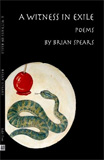Review by Jeannine Hall Gailey
Louisiana Literature Press
SLU Box 10792
Hammond, LA 70402
ISBN 978-0945083290
2011, 72 pp., $14.95
louisianaliterature.org
Brian Spears introduces the subject matter of the book right in the title: A Witness in Exile refers to his disenchantment and estrangement from the religion of his childhood as a Jehovah’s Witness and because of this, his family of origin as well. Some of the best poetic moments in the book use to great effect the combination of a warm sense of humor and a poignant desire to believe.
A secondary theme throughout the book is Spears’ attachment to landscapes (Florida, New Mexico, California, and Louisiana, in particular) that seem in many poems to be threatened both ecologically and spiritually. Many of them have whimsical titles like “One Day the Ruins of the Galleria Mall Will Shelter Armadillos” or “’Salons are collecting hair to soak up oil.’” The speaker’s exiled wanderings keep him pondering the vulnerability and perpetually-changing nature of the world around him.
I have to admit that what drew me to the book initially was the quality of the poems’ voice – an idiosyncratic, approachable voice that I believe many regular readers of Rattle would enjoy. (In fact, I immediately scanned the acknowledgement page to see if Rattle would be there, because the poems would seem very at home in one of their issues!) Spears writes poems that are playful without being complicated, intelligent while still being fairly direct. The echoes of Biblical language in many of the poems elevate the sonics in a way that reminded me sometimes of song, sometimes of the cadences of the church service. “i sing of Brian, born of God” reminded me of both E.E. Cummings and a psalm, the tone teetering between resignation and triumph:
who spent his life entrenched at prayer
his palms clasped so, his shoe soles bare…
That Brian is no longer here.
His parents say he is not one
of their body, though Christ is love…
This kind of bare-knuckled autobiography works well because Spears chooses painstakingly authentic details–the flattering and unflattering, the dramatic and the mundane–with witty mindfulness.
The second thing that attracted me to the book was the way in which the author approached the religion of his youth–with both wry distance and with humane respect. I believe it’s difficult to treat the subject of belief and unbelief well, and Spears has done a great job of it in this collection. The final poem of the book, in particular, “Jubilate Patro,” in the form of Christopher Smart’s poem “For I Will Consider My Cat Jeoffry,” is particularly heart-wrenching. It describes the speaker’s conflicting feelings for his father, the father’s struggle with Alzheimer’s, and the lessons the speaker learned from his father:
For his favorite animal was a porcupine, a creature of defense…
For when Louis Jordan came on the stereo he would grab my mother and twirl her
in the living room of our trailer so that the floors shook…
For he taught me there are things more important than family and sometimes I hate him for that
For his father is Jehovah and he has no son anymore
The portrait the speaker of the poem paints of his father is one of pained love, anger, and acute observation.
A Witness in Exile is not divided into sections, but the general motion of the book is from the impersonal–descriptions of the worlds around the writer–to more personal poems. This made the second half of the book more compelling to me, because these poems are the ones that highlight Spears’ deft use of tone and language.
Overall, Brian Spears’ first collection demonstrates the humour that can be mined in the apocalyptic, the love that can be salvaged from broken family relationships, and a faith based in an unblinking consideration of the fragile human concepts of truth, God, trust, and forgiveness.
Comments are closed.